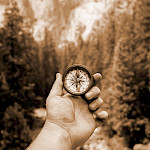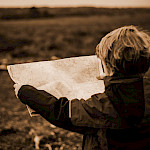How to follow Christ step by step
Such was Jesus when He lived in this world; and we, as partakers of His nature — His life, and having His Spirit dwelling in us are called to walk in His steps, and live a life of simple dependence upon God, from day to day. Of this life of dependence, in one special phase of it, we have a graphic and beautiful type at the close of our chapter. The Israel of God — the camp in the desert — that pilgrim host followed the movement of the cloud. They had to look up for guidance. This is man`s proper work. He was made to turn his countenance upward, in contrast with the brute, who is formed to look downward.* Israel could form no plans. They could never say, "To-morrow we shall go to such a place." They were entirely dependent upon the movement of the cloud. Thus it was with Israel, and thus it should be with us. We are passing through a trackless desert — a moral wilderness. There is absolutely no way. We should not know how to walk, or where to go, were it not for that one most precious, most deep, most comprehensive sentence which fell from the lips of our blessed Lord, "I am the way." Here is divine infallible guidance. We are to follow Him. "I am the light of the world: he that followeth me shall not walk in darkness, but shall have the light of life." (John 8) This is living guidance. It is not acting according to the letter of certain rules and regulations; it is following a living Christ; walking as He walked; doing as He did; imitating His example in all things. This is Christian movement — Christian action. It is keeping the eye fixed upon Jesus, and having the features, traits, and lineaments of His character imprinted on our new nature, and reflected back or reproduced in our daily life and ways.
Now this will, assuredly, involve the surrender of our own will, our own plans, our own management altogether. We must follow the cloud; we must wait ever — wait only upon God. We cannot say, "We shall go here or there, do this or that, to-morrow, or next week. "All our movements must be placed under the regulating power of that one commanding sentence — often alas! lightly penned and uttered by us — "If the Lord will."
Oh! that we better understood all this! Would that we knew more perfectly the meaning of divine guidance! How often do we vainly imagine, and confidently assert, that the cloud is moving in that very direction which suits the bent of our inclination. We want to do a certain thing, or make a certain movement, and we seek to persuade ourselves that our will is the will of God. Thus, instead of being divinely guided, we are self-deceived. Our will is unbroken, and hence we cannot be guided aright, for the real secret of being rightly guided — guided of God — is to have our own will thoroughly subdued. "The meek will he guide in judgement; and the meek will He teach His way." And again, "I will guide thee with mine eye." But let us ponder the admonition, "Be ye not as the horse, or as the mule, which have no understanding; whose mouth must be held in with bit and bridle, lest they come near unto thee." (Psalm 32) If the countenance be turned upwards to catch the movement of the divine "eye," we shall not need the "bit and bridle." But here is precisely the point in which we so sadly fail. We do not live sufficiently near to God to discern the movement of His eye. The will is at work. We want to have our own way, and hence we are left to reap the bitter fruits thereof. Thus it was with Jonah. He was told to go to Nineveh but he wanted to go to Tarshish; and circumstances seemed to favour; providence seemed to point in the direction of his will. But alas! he had to find his place in the belly of the whale, yea, in "the belly of hell" itself, where "the weeds were wrapped about his head." It was there he learnt the bitterness of following his own will. He had to be taught in the depths of the ocean the true meaning of the "bit and bridle," because he would not follow the gentler guidance of the eye.
But our God is so gracious, so tender, so patient! He will teach and He will guide His poor feeble erring children. He spares no pains with us. He occupies Himself continually about us, in order that we may be kept from our own ways, which are full of thorns and briars, and walk in His ways, which are pleasantness and peace.
There is nothing in all this world more deeply blessed than to lead a life of habitual dependence upon God; to hang upon Him, moment by moment, to wait on Him and cling to Him for everything. To have all our springs in Him. It is the true secret of peace, and of holy independence of the creature. The soul that can really say, "All my springs are in thee" is lifted above all creature confidences, human hopes, and earthly expectations. It is not that God does not use the creature, in a thousand ways, to minister to us. We do not at all mean this. He does use the creature; but if we lean upon the creature instead of leaning upon Him, we shall very speedily get leanness and barrenness into our souls. There is a vast difference between God`s using the creature to bless us, and our leaning on the creature to the exclusion of Him. In the one case, we are blessed and He is glorified; in the other, we are disappointed and He is dishonoured.
It is well that the soul should deeply and seriously consider this distinction. We believe it is constantly overlooked. We imagine, oft-times, that we are leaning upon, and looking to, God, when, in reality, if we would only look honestly at the roots of things, and judge ourselves in the immediate presence of God, we should find an appalling amount of the leaven of creature confidence. How often do we speak of living by faith, and of trusting only in God, when, at the same time, if we would only look down into the depths of our hearts, we should find there a large measure of dependence upon circumstances, reference to second causes, and the like.
Christian reader, let us look well to this. Let as see to it that our eye is fixed upon the living God alone, and not upon man whose breath is in his nostrils. Let as wait on Him — wait patiently — wait constantly. If we are at a loss for anything, let our direct and simple reference be to Him. Are we at a loss to know our way, to know whither we should turn, what step we should take? Let us remember that He has said, "I am the way;" let us follow Him. He will make all clear, bright, and certain. There can be no darkness, no perplexity, no uncertainty, if we are following Him; for He has said, and we are bound to believe, "He that followeth me shall not walk in darkness." Hence, therefore, if we are in darkness, it is certain that we are not following Him. No darkness can ever settle down upon that blessed path along which God leads those who, with a single eye, seek to follow Jesus.
But some one, whose eye scans these lines, may say, or at least may feel disposed to say, "Well, after all, I am in perplexity as to my path. I really do not know which way to turn or what step to take." If this be the language of the reader, we would simply ask him this one question, "art thou following Jesus? If so, thou canst not be in perplexity. Art thou following the cloud? If so, thy way is as plain as God can make it." Here lies the root of the whole matter. Perplexity or uncertainty is very often the fruit of the working of the will. We are bent upon doing something which God does not want us to do at all — upon going somewhere that God does not want us to go. We pray about it, and get no answer. We pray again and again, and get no answer. How is this? Why the simple fact is that God wants us to be quiet — to stand still — to remain just where we are. Wherefore, instead of racking our brain and harassing our souls about what we ought to do, let us do nothing, but simply wait on God.
This is the secret of peace and calm elevation. If an Israelite, in the desert, had taken it into his head to make some movement, independent of Jehovah; if he took it upon Him to move when the cloud was at rest, or to halt while the cloud was moving, we can easily see what the result would have been. And so it will ever be with us. If we move when we ought to rest, or rest when we ought to move, we shall not have the divine presence with us. "At the commandment of the Lord they rested in the tents, and at the commandment of the Lord they journeyed." they were kept in constant waiting upon God, the most blessed position that any one can occupy; But it must be occupied ere its blessedness can be tasted. It is a reality to be known, not a mere theory to be talked of. May it be ours to prove it all our journey through!
___________________________
*The Greek word for man (anthropos) signifies to turn the face upwards.
Previous article




